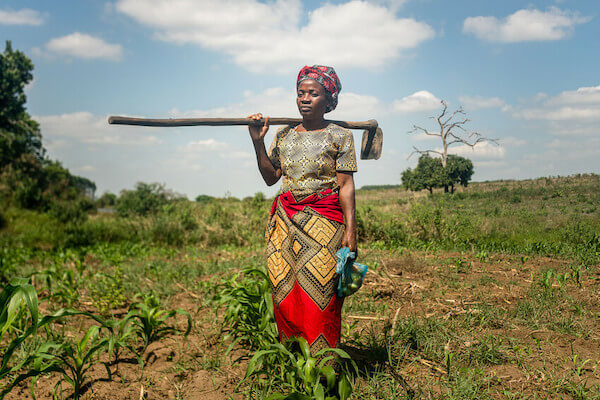“We can’t control the weather.”
It’s a phrase we’ve all heard, but one that is especially poignant for those who depend on agriculture to survive. For farmers, disruptions in the weather can change their livelihoods—and their lives. And for subsistence farmers—those who rely on farming to feed themselves and their family—a single crop, a single storm, or a single season could decide whether their children attend school or have enough to eat.
For these families, the inability to control the weather can feel terrifying.
In 2016, the World Bank estimated that natural disasters push 26 million people into poverty each year, and those already living in poverty face heightened risks from weather incidents. Families living in poverty are more likely to live in informal housing, leaving them vulnerable to the effects of extreme weather. They are also likely to work in the sectors that are most susceptible to natural disasters.
In Mozambique, a southern African nation with a long coastline on the Indian Ocean, Opportunity International has witnessed firsthand how dangerous natural disasters can be for families in poverty. According to the United Nation’s Global Assessment Report on Disaster Risk Reduction, Mozambique ranks third as the most vulnerable country in Africa to disaster risks. In the last 35 years, there have been 75 declared disasters.
In addition, some 80 percent of the population relies on agriculture for their livelihood. That means that four out of every five people in Mozambique work in an industry particularly susceptible to natural disasters—in a country that itself faces a considerable risk of natural disasters. It is a complex situation without an easy solution.
Building Resilience in the Face of Disaster
The World Bank writes that despite these enormous challenges, there are ways to cushion the devastating blow those living in poverty will suffer from natural disasters, including “improved access to personal banking, insurance policies, and social protection systems (like cash transfers and public work programs).”
Efforts like these will “help people better respond to and recover from shocks”—and it’s efforts like these that Opportunity International builds and delivers to farmers daily.
In 2019, Opportunity International witnessed and responded to the disastrous effects of Cyclone Idai in Mozambique. This event underscored the connection between farmers and the natural, unpredictable world around them.
In the storm’s wake, 2.2 million people were left in need of urgent assistance in Mozambique, and 1.8 million acres of crops were destroyed. A year later in March 2020, 100,000 individuals remained in resettlement sites.
What Disaster Response Looks Like
When Cyclone Idai hit, Opportunity client Ana Viola Macaza noted how the storm “destroyed our crops and some houses and left other houses with cracks.”

Before the storm, Ana Viola had received a loan from Opportunity that she used to purchase more land. This investment allowed her to begin growing and selling bananas. With her extra income, she “managed to buy more land and start building a house.” What’s more, she started saving, which allowed her to receive additional loans that transformed her business’s capacity and resilience.
So when the storm swept through her community, the training Ana Viola received from Opportunity International gave her the know-how to move forward. “Opportunity has helped me understand how to keep my money in the bank instead of at home…In the future, I think about continuing with agriculture, and also doing other things, like building a house [and] buying a car,” she said.
Similarly, Moises Manuel Miguel, a farmer specializing in grain production, also benefited from his Opportunity International savings account. When Cyclone Idai wiped out his income, Moises was able to rely on saved funds: “Opportunity has helped me to understand how to save my money in the bank to keep it secure,” he shared.
Now, Moises looks to the future and hopes to see his children attend university.
The Power of Financial Inclusion
Amidst uncertainty, financial security provides opportunities for resilience and recovery after natural disasters. Following Cyclone Idai, Opportunity worked closely with farm business advisors (FBAs)—individuals who help farmers get the materials they need, like seed and fertilizer, and access lending—to disseminate emergency funds to those most in need.
A year later, Opportunity visited Mozambique and saw that our small learning lab, led by FBAs, reached more than 20,000 farmers with relief and recovery funds. In an average year, that program only reached 4,000 individuals!
As climate change heightens the frequency and intensity of natural disasters, farmers’ ability to withstand and recover from natural disasters will only grow more critical. We affirm comments made by CGAP and other leading experts that note, “It is vital therefore that any development agenda, including financial inclusion, considers how poor and vulnerable households can build resilience and adapt to the climatic changes impacting their lives.”
In Mozambique—and around the world—Opportunity International is building products and programs to meet clients’ needs as they arise. That means developing tools for recovery post-disaster, equipping smallholder farmers with the ability to withstand environmental shocks, and creating financial tools for those living in poverty. And it means building relationships with entrepreneurs and farmers like Ana Viola and Moises, listening to their needs, and helping them build resilience to weather whatever comes.


